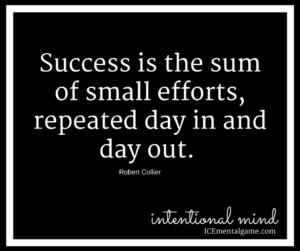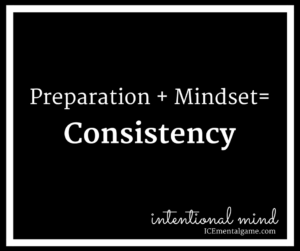 Are You Consistent?
Are You Consistent?
A top complaint I hear from skaters is that they lack consistency during competition, in practice, or when they jump or do other difficult skills. When a skater lacks consistency, it is almost impossible to build confidence in their skills. Without confidence, a skater isn’t able to trust in their abilities.
If you have trained well, your body is ready to skate, jump and spin automatically. But without trust, you cannot truly be in the performance mindset in competition, or relaxed and ready in practice.
When you don’t trust in your skills, you think or over-think what you need to do to get it right, or what you don’t want to do to mess up. When you think, tension creeps into your body, and that tension makes it hard for your body to execute the complex movements needed for skating.
Here are some of the most common complaints I hear from skaters:
“My jumps are inconsistent.” I can land all of my jumps in practice one day, then the next day I can’t even find my axis to get a good rotation.
“I run clean programs the weeks before competition, but when I get to competition, I fall, even on my easiest jumps!”
I feel great one day and everything is so easy, but the next day it’s like I’m a different skater. I feel grumpy and tired and I can’t do anything right.
Consistency from; practice to practice, practice to competition or from one competition to the next in any sport is difficult, but in a technical sport that relies on hundredths of a second timing, consistency can mean the difference between becoming an International competitor or a remaining a local competitor.
What exactly is consistency?
 Consistency = Preparation + Mindset
Consistency = Preparation + Mindset
- Keep your body in top shape.
- Sound technical instruction and purposeful repetition leads to consistency.
- Confident
- Present focused
Practicing a confident and present focused mindset everyday will lead to a confident and present focused mindset in competition.
Consistency is your lifestyle.
Proper preparation starts at home, not just when you step onto the ice. In order to train and perform consistently at high levels, your body must be ready and able to handle the stress of training and competing.
- Stick to a consistent bedtime to get enough sleep.
- Eat nutritious food, and eat enough of it to support your practice needs.
- Drink water to stay hydrated on top of what your body needs to function.
Young athletes don’t always appreciate the importance of getting a good night sleep and eating well. Being well rested will help to prevent injuries as well as keep the mind sharp so that you can take full advantage of your training time.
Sound Technical Instruction
A skater needs sound technical guidance. Your coach will give you the necessary detailed stepping stones to the skills you want to master.
You must make a plan for practice sessions that is in line with your daily goals, which are in turn in line with your season goal. Read about goals here.
A skater must have a system in place to ensure they are doing the drills and exercises correctly. Exercises and drills are a chance for the body to train correct positioning and timing.
Figure skaters can learn from football or basketball training. At a team practice you will see the athletes going through group drills, beginning with more general calisthenics, then breaking off into groups of more specialized drills, such as receivers running patterns while the quarterback throws the ball.
Purposeful Repetition Leads to Consistency
Skaters can learn to bring this structure to their practice.
What most skaters do when they get on the ice for practice is skate around to warm up, do a few laps of stoking, do jump warm ups up and down the sides of the rink, back spins, warm up jumps, then run programs. Many just go through the motions.
When practicing developmental jumps, they repeat fall after fall, maybe pausing briefly in between to think about what’s wrong and then jump again.
Instead of hoping the law of averages will finally be in your favor, make drills a part of your practice plan. Drills and exercises allow you to repeat smaller parts of the jump until your body knows the feeling it needs to be successful.
Start from the foundation of your jump, (i.e. back spins), and progress step by step to the finished jumps.
Begin at simple and progress to complex for all skills, not just jumps.
Understand that repetition trains consistency. So train with the intention of improving.
Mindset for Consistency
Attitude and work ethic
How you show up to practice each day will lead to consistency. Show up at the rink ready to work, take time to make your plan, practice with purpose and the intention to improve.
A skater who doesn’t have a plan for practice until they get to the rink, who feels too tired to do an off ice warm up, and who skips a few reps during dryland workout because they don’t want to be sore the next day, is training consistently to be inconsistent.
Instead, be a skater who trains for consistency:
- Show up to the rink ½-1 hour before your session with your plan for the day
- Use your off ice warm up to prepare your mind to focus on the practice session ahead
- Do your dryland, conditioning, stretching and mental game exercises knowing that you are getting stronger every day.
- Practice with purpose using your process goals to keep you focused in the moment.
Manage your emotions
Understand that every day contributes to your improvement whether it is a great day or a “struggle” day.
No one likes “struggle” days, yet they are inevitable. Even professional athletes and elite skaters have ups and downs. One season, Olympic champion Yuzuru Hanyu skated beautiful programs at Japanese Nationals and in the Grand Prix Final, but had difficulty at the World Championships.
There is no such thing as a high level athlete who hasn’t had to overcome adversity in their careers. Adversity and “struggle” days are opportunities to practice and get stronger in your mental game.
When you are struggling:
- Step back and take a deep breath, release the tension in your shoulders.
- Remember you have a plan.
- Look at the plan.
- Figure out exactly what you are working on right at this moment.
- Focus only on that one thing.
- Break the skill down when you feel overwhelmed. For example, if you can’t seem to land a jump, break it down into smaller skills, then build it back up once you get back on track.
Everyone can put the pieces together to create consistency in their skating. From wherever you are now, start small and add little bits of consistency to your life, one at a time. Start with something easy first.
For example: do a short 15 minute warm up before your first training session of the day for a week. The next week add some visualization into your routine. When you can do those things consistently, start to notice when you feel frustrated on the ice and take steps to refocus and break the skill down.
Consistency = Preparation + Mindset
Think of consistency as your house, when it is built you will feel confident and trust your abilities in practice and in competition. Work each day to put one more brick of preparation or mindset into place and watch your consistency improve in jumps and skills, practice, and in competition.
If you want to learn more, download The Confidence eBook complements of ICE Mental Game.
